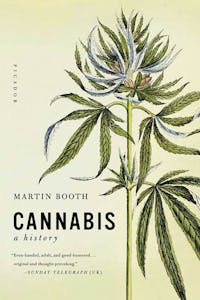Cannabis
A History
 Download image
Download image
ISBN10: 0312424949
ISBN13: 9780312424947
Trade Paperback
448 Pages
$24.00
To some, it's the classic "gateway drug," dangerous and addictive; to others, it is a harmless way to relax, or to provide relief from pain. Whatever the viewpoint, cannabis incites debate at every level, and the effect it has on every corner of the globe is undeniable.
In this comprehensive study, renowned writer Martin Booth crafts a tale of medical advances and religious enlightenment; of political subterfuge and law enforcement; of cunning smugglers, street pushers, gang warfare, writers, artists, musicians, happy-go-lucky hippies, and potheads. Above all, Booth demonstrates how and why the case for decriminalization remains one of this century's hottest topics.
Reviews
Praise for Cannabis
"Amazingly informative and riveting . . . Quite intoxicating."—Financial Times (UK)
"Fascinating . . . A clear-headed and sustained case."—The Sunday Times (UK)
"Even-handed, adult, and good-humoured . . . Original and thought-provoking."—Sunday Telegraph (UK)
"Well-researched."—The Seattle Times
"An investigation of the culture of hemp, the most widely distributed hallucinogenic on Earth. The cannabis industry is huge, certainly. It is a major crop worldwide, surpassing, for example, logging in British Columbia. It is farmed in basements everywhere. Hemp regularly makes the happy trek from Tangier and Nepal, Kabul and Amsterdam, Jamaica, Bombay, and Brooklyn in the forms of marijuana and hashish. Hemp can be used for food, fuel, and fiber, but novelist Booth's wide-ranging report concentrates on the fun many have derived from Mary Jane and hash. It can be traced back to the days of our Neolithic forbears, the classical civilizations of Greece, Rome, and China. Indians and Arabs used cannabis in one form or another, and the eating or smoking of it blossomed in England and America. Thomas Wedgwood tried it and Louisa May Alcott featured the stuff in a story. It was used, notes Booth, by Satchmo, Malcolm X, Bob Marley, Keith Richards, Robert Crumb, Allen Ginsberg, Jack Kerouac, and many, many others, including the fictional Dr. Fu Manchu. Difficulties increased a couple of generations ago with the onslaughts of head federal narc Harry J. Anslinger. The 20th-century war on drugs seems to be a loser, possibly because usage does not seem to be all that harmful. While he doesn't deny some possibly allied ill effects (like crashes involving a stoned 'train driver' and a high pilot), Booth tells of the scientific exaggerations repeated by the press without basis: 'The war on cannabis is being fought from a concern not for public health or order . . . but for public morality.' Before reaching that conclusion, the indefatigable author presents much of the literature, mythology, horticultural science, pharmacology, and political and social history: the uses and misuses of the vegetation so friendly to mankind as balm and analgesic. Along with Eric Schlosser's Reefer Madness, this could become a staple at neighborhood head shops. Readable and comprehensive, loaded as fudge: the only hash book you'll ever need."—Kirkus Reviews
"Booth, author of a sweeping history of opium, now offers a global history of cannabis, especially its production and uses as hashish and marijuana. In doing so, he tracks the plant's biological, pharmaceutical, medicinal, religious, cultural, literary, social, and regulatory history from ancient China and India, through the Middle East and Africa, into Europe and the Americas, and finally to middle-class American suburbs, Amsterdam coffee shops, and recording studios everywhere today. Cannabis has proved a versatile and variable plant, spreading on the trade winds and through commerce, conquest, and countercultures. Booth does much to debunk the many myths surrounding cannabis and the onus as a supposed stimulant for violent, antisocial, Communist, and other disruptive behavior with which antidrug forces sought to link it, instead pointing out its often beneficial effects in art, literature, music, and pain relief and its benign effect on human relations . . . A remarkably 'cool' account of a plant that people round the world, to paraphrase the Beatles, had to get into their lives. Get this book instead."—Library Journal
"In this densely packed, wide-ranging history, Booth draws on religion, history, ecology, horticulture, linguistics, pop culture, and medical research to correct the falsehoods surrounding the oft-banned plant and to painstakingly build his case that the war on cannabis has little to do with concerns for public health or order. Along the way, Booth introduces a dizzying parade of historical persons that includes visionaries, scientists, beatniks, farmers, artists, soldiers, and smugglers. Unlike many of the other more partisan books on cannabis, the overall tone of Booth's volume is objective, unemotional, and factual—a stance that makes for fine impartial argument . . . The book's attention to detail lures the reader ever more deeply into cannabis history. Descriptions of hip, mid-century New York, London, and Amsterdam, for example, help illuminate the role of cannabis in more recent cultural movements. And a quick survey of the myths about the drug's psychological effects shows how laws banning cannabis were often used as an excuse to suppress blacks and migrant Mexican workers. Booth also discusses provocative legal, political, and economic actions (for and against cannabis) that have affected millions of people. In his profile of a plant that can be an intoxicant, fiber, cooking ingredient, medicine, and potential source of environmentally friendly products, he gives readers a fascinating sourcebook about 'the most widely produced, trafficked, and used illicit drug on earth.'"—Publishers Weekly


